Franz 2.0 - Working Context, Lore, Improved Planning, and More
8/28/2025By Friends & Fables
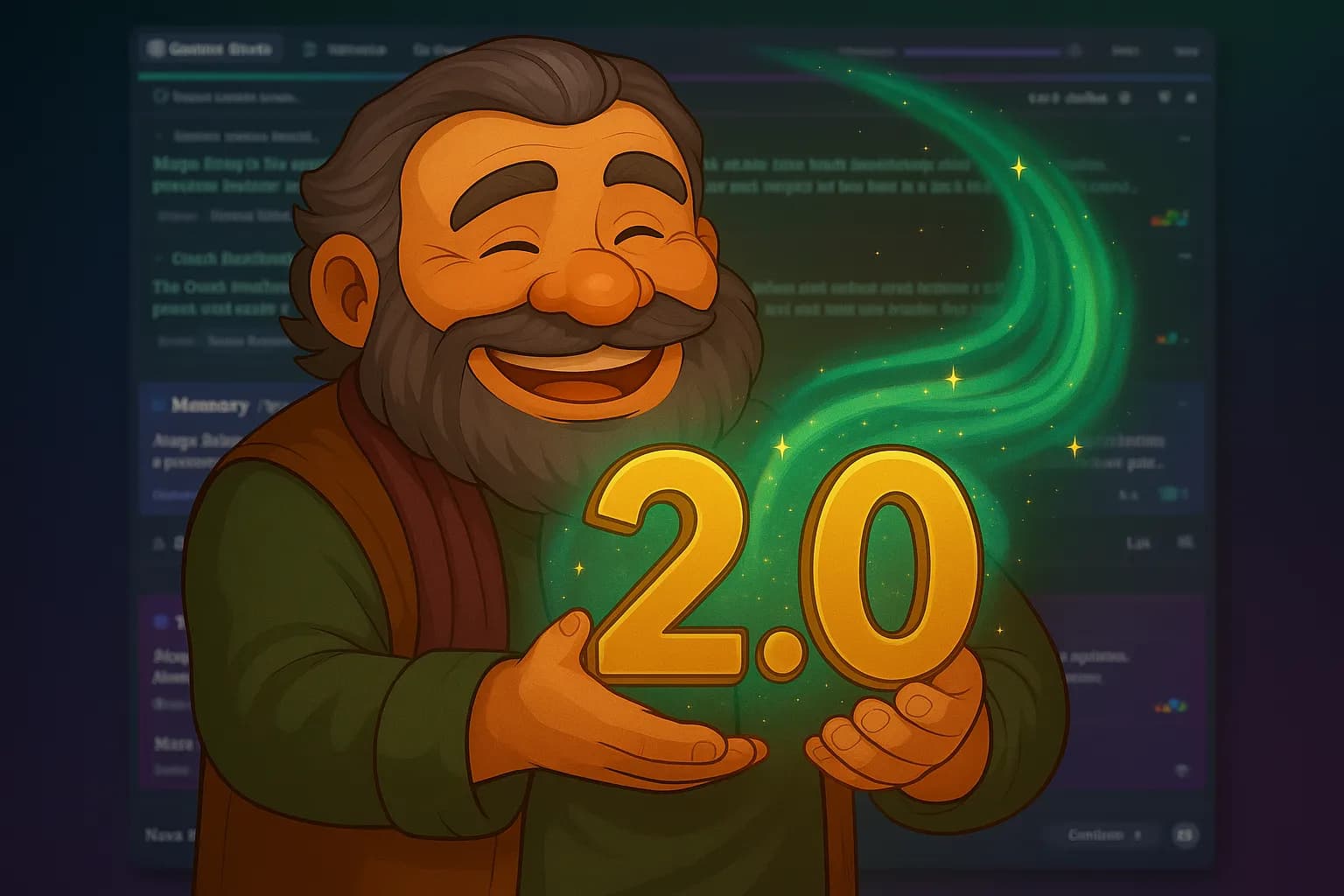
Hey Friends,
We're thrilled to announce Franz 2.0! This update represents months of development and incorporates invaluable feedback from our community over the past year. We'll cover the highlights first, then dive into the details for those who want the full picture.
Our Core Goals for Franz 2.0:
Better Input, Better Output – Improve Franz’s responses by making sure we provide the right context at the right time, while cleaning out less relevant context
Improve Storytelling – Improve memory, narrative cohesiveness, and variation in storytelling
Flexible control – Give power users full control over context management, while making the hands-free experience even better for casual players
Greater transparency – Give players more visibility into exactly what context Franz uses for responses
Improve Game State Updates – Make game state updates more accurate and deliver them at the right time
Better reactivity and instruction following - When players argue or correct Franz, he should remember what the player wanted
Give you the best AI RPG / Game Master experience - We’re focused on delivering as much value in the product as we can. With this update, we’re confident there’s nothing else like Friends & Fables on the market. We’re projecting this update will increase our costs by 33-100%, but we think it is worth it to deliver a better experience for you all.
Here are some of the big new features and updates we’ve made:
Context Blocks - Context blocks are editable text blocks that serve as the new foundation for managing context. They're designed for flexibility, allowing you to bring in any context you want and giving you ultimate control over what information is available to Franz.
Research Step - Franz will now perform a research step before he responds. He will read lore, memories, character sheets, and more to automatically create context blocks from the most relevant information. The research step automatically takes care of managing your context blocks for you, so you don’t have to lift a finger unless you want to.
Plot and Plan - Franz will now update the plot (summary of recent events) and update his plan at the end of every message. This greatly improves his storytelling abilities, and allows you to view and edit his plan.
Scene Context - Besides context blocks, we automatically build scene context that shows Franz where you are in the world, nearby locations, character sheets, and more. We’ve always done this, but now we show you exactly what Franz sees.
Working Context - Context Blocks, Plot & Plan, and Scene Context come together to form Working Context, which represents almost all of the context Franz sees on his next turn. We’ve added a convenient drawer right above the text input for you to quickly view and edit the working context.
New Architecture - The response you get from Franz is created from a collection of different processes. We’ve rewritten the composition of these core processes to deliver faster responses, more accurate game state updates, and more natural OOC responses.
There are also a handful of other important changes to subscription plans, response modes, custom instructions, and quests that we’ll get into more detail below.
For those of you who have been around for a while, you might remember our last update was ACE 1.5.6. We’ve decided to retire the ACE (agentic campaign engine) name and just refer to everything related to the backend game master / game engine as Franz.
Working Context
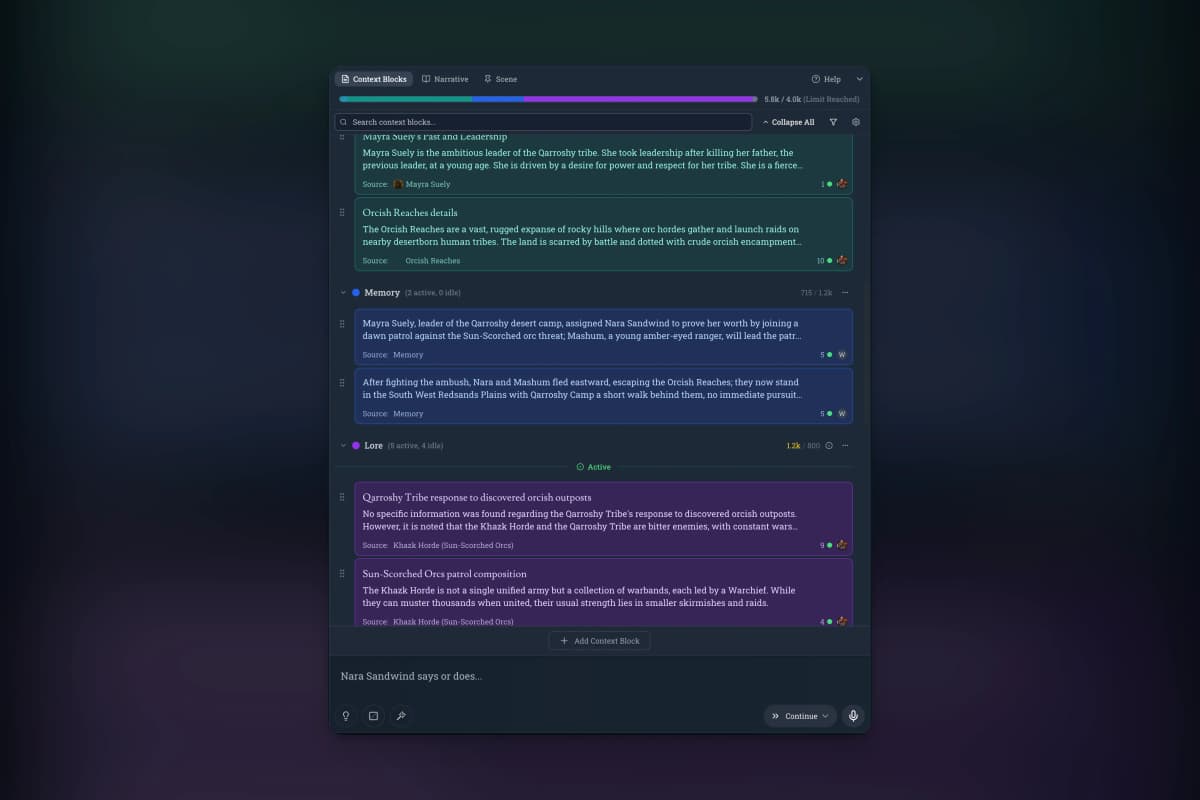
The working context drawer is made up of context blocks, plot and plan, and scene context. These three tabs represent almost all of the context Franz will see on his next turn, except for our system instructions and any new blocks the research step creates.
You can think of working context as a shared notepad between you and Franz. In a campaign, the world, memory, and lore tabs serve as a GM’s books and documents that serve as the foundation of the campaign, and the working context are the specific notes from those documents the GM pulls up for the current moment.
Context Blocks
One important thing we’ve learned in the last year is that less is more when it comes to the context used in the narration step. The key is having the right context at the right time. If you are in a tavern scene asking the barkeep for an ale, it’s counterproductive to have memories of your last quest or instructions on how Franz should describe a fight scene. That’s why we’ve created Context Blocks, which are extremely flexible, easy to use, and automated blocks of context. Context Blocks have the following properties:
Block Type
Instruction - Used for custom instructions. When you correct Franz, he will automatically create instruction blocks to save your instructions for the future.
Memory - These blocks are for including memories that previously happened in the campaign. They include a short cut to the memories screen, so you can quickly add existing memories (or if you want, you can now inject new ones).
Entity - These blocks are created from character sheets, monster or item stat blocks, etc.
Lore - Franz can read your lore now! The research step will automatically query lore and pull in relevant information. You can also manually bring in snippets of lore into context.
Misc - For you to add anything else that doesn’t fit in above.
Block Status
Blocks can be active, idle, or archived.
Active: The block is being used in context.
Idle: The block has not expired, but is not used in context because the current budget limits have been met. If space frees up, this block will be active.
Archived: This block has either expired or been manually archived.
Block Priority
You can drag and drop blocks to order their priority. If there is an idle block you think is more important than an active block, you can drag to reorder them.
Block Expiration
You can set the expiration for a context block. If you know a block is only important for the next few turns, you can set the expiration and then forget about it! The blocks automatically created by Franz are also set to expire to clean themselves up when appropriate.

Block Sources
Sources are linked at the bottom of context blocks, so you can see what the research step was looking at when it created the block.

Adding Context to Blocks
We’ve added short cuts to quickly add memories or lore. Just choose those block types and you’ll see a “View Memories” or “View Lore” button. We’ll add shortcuts for entities in the future.

Group Budgets and Limits
Each block type is categorized into a group and allocated a certain % of the total context budget. When a group has reached its budget, if the total budget limit has been reached, low priority blocks will become idle until space frees up.
We know that different players have different preferences and needs, so you can adjust the budget allocation for each group via the working context settings tab. E.g some players don’t play with any instructions at all, and can lower the budget allocated for instructions to make more room for memories or lore.
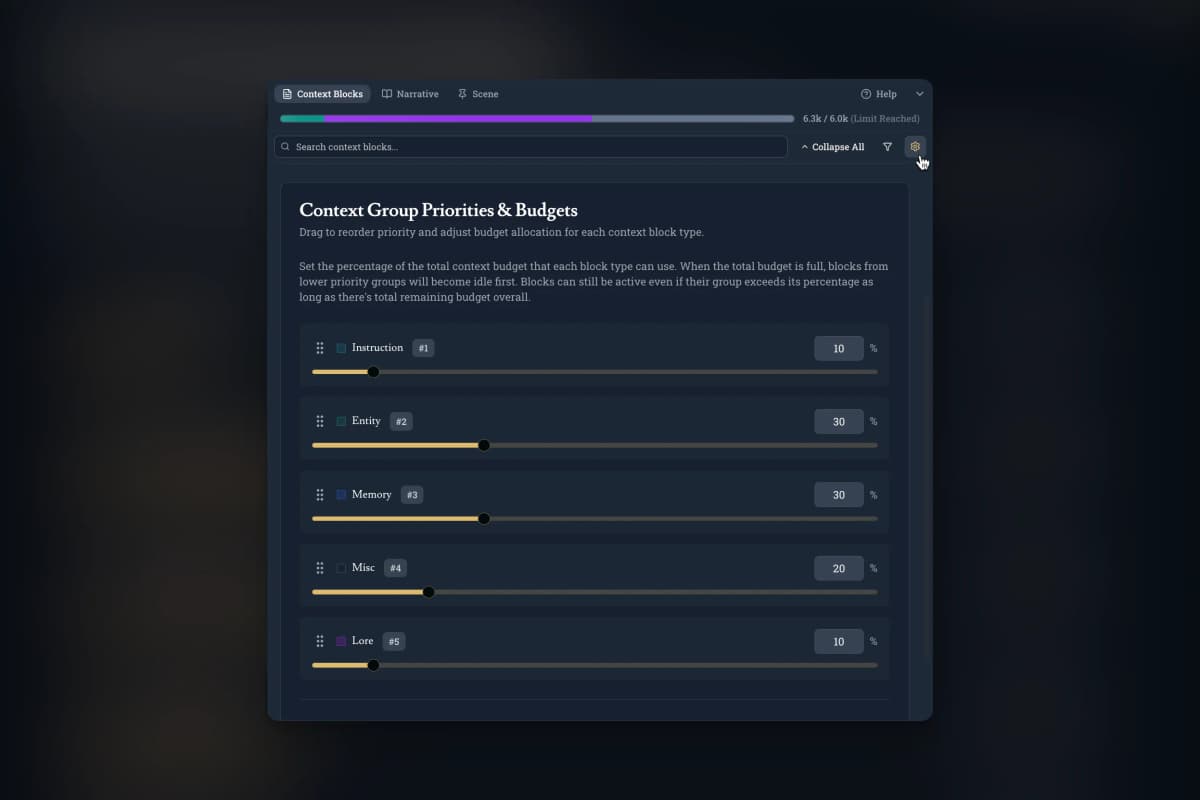
One thing we want to stress is it’s totally fine to go over your limit! The limit just enforces which blocks end up being used. Any block that goes over your limit will just sit idle, but generally this is fine! Context Blocks are self managing, so the most relevant blocks will take priority over older ones.
Plot and Plan
The plot and plan are new features we’ve added to help improve Franz’s storytelling and cohesion over time. Franz updates the plot and plan on every single turn. Both are editable. We’ve heard in alpha feedback that these have made a huge difference!
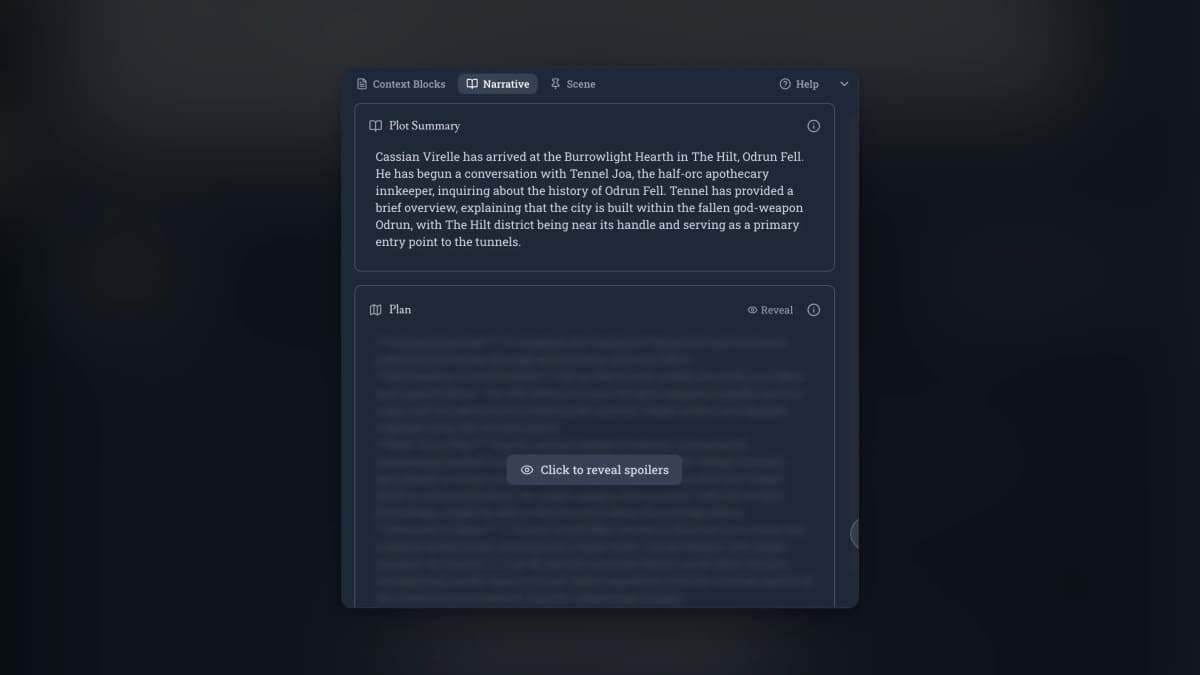
Scene Context
We’ve been providing this context to Franz all along, but we’ve decided to display it so you can see exactly what we provide by default. This scene context will generally show Franz where you are in the world, nearby locations, basic world context, and nearby characters, monsters, and items.
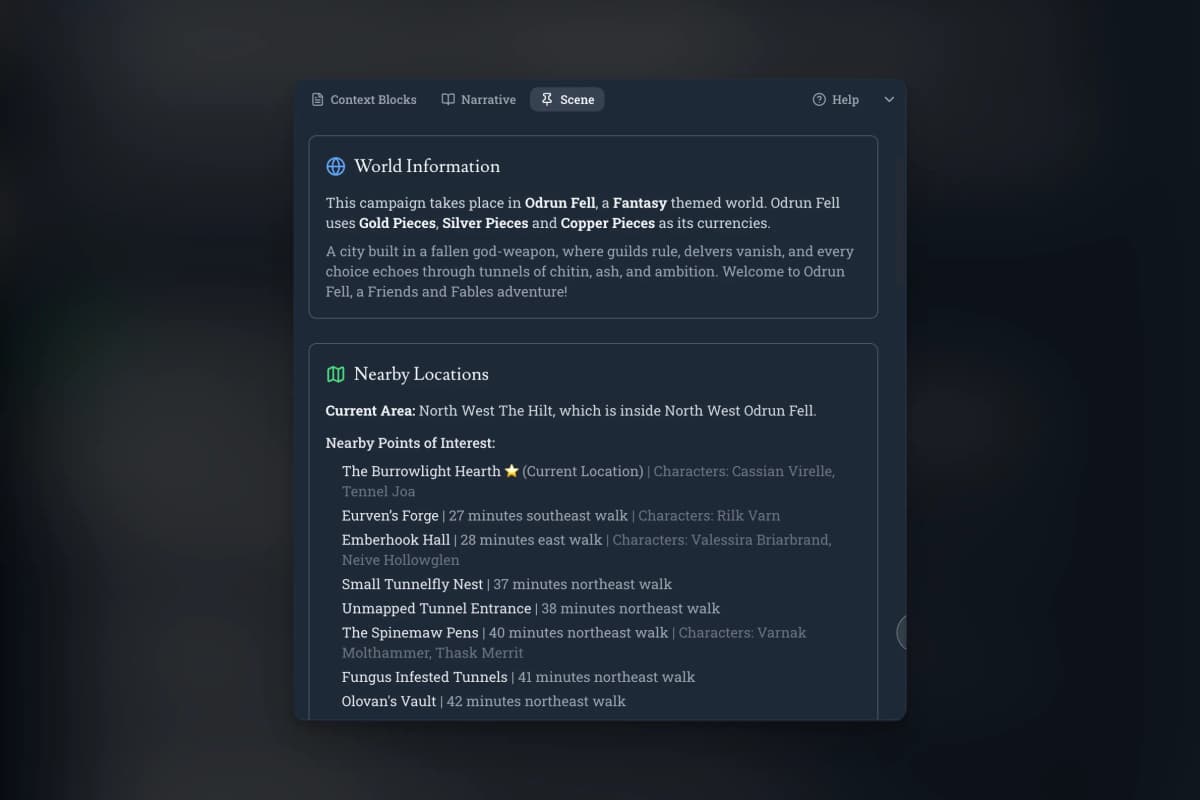
Response Modes
The Narrative / Conversation / OOC response mode picker has now been deprecated. Previously these three modes were different systems under the hood. In Franz 2.0, they’ve been unified into one system. You’ll still be able to have the same types of conversations, but Franz 2.0 will automatically switch between them.
The player only mode has been moved into the Continue Mode picker, which is still next to the send button.
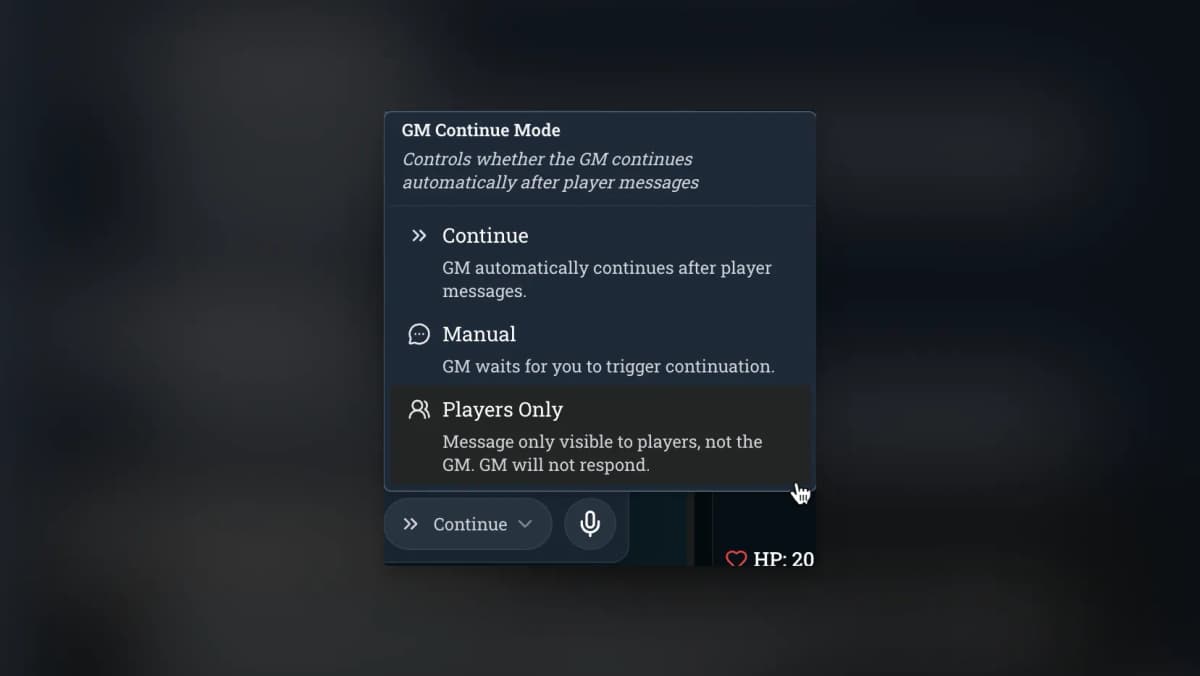
Lore Research
During the research step, Franz will search across the existing campaign data which includes Lore entries. It’s important to know that Franz researches Lore based off the folder titles, page titles, and page headings of lore pages. Franz initially has access to all of the Lore page titles and headings, and based on the research questions asked, he will pick the most relevant lore pages and sections denoted by headings to read and potentially bring into context.
If Franz decides to perform research, you can see the topics he researched along with the blocks created and the source of the lore/memory/entity.
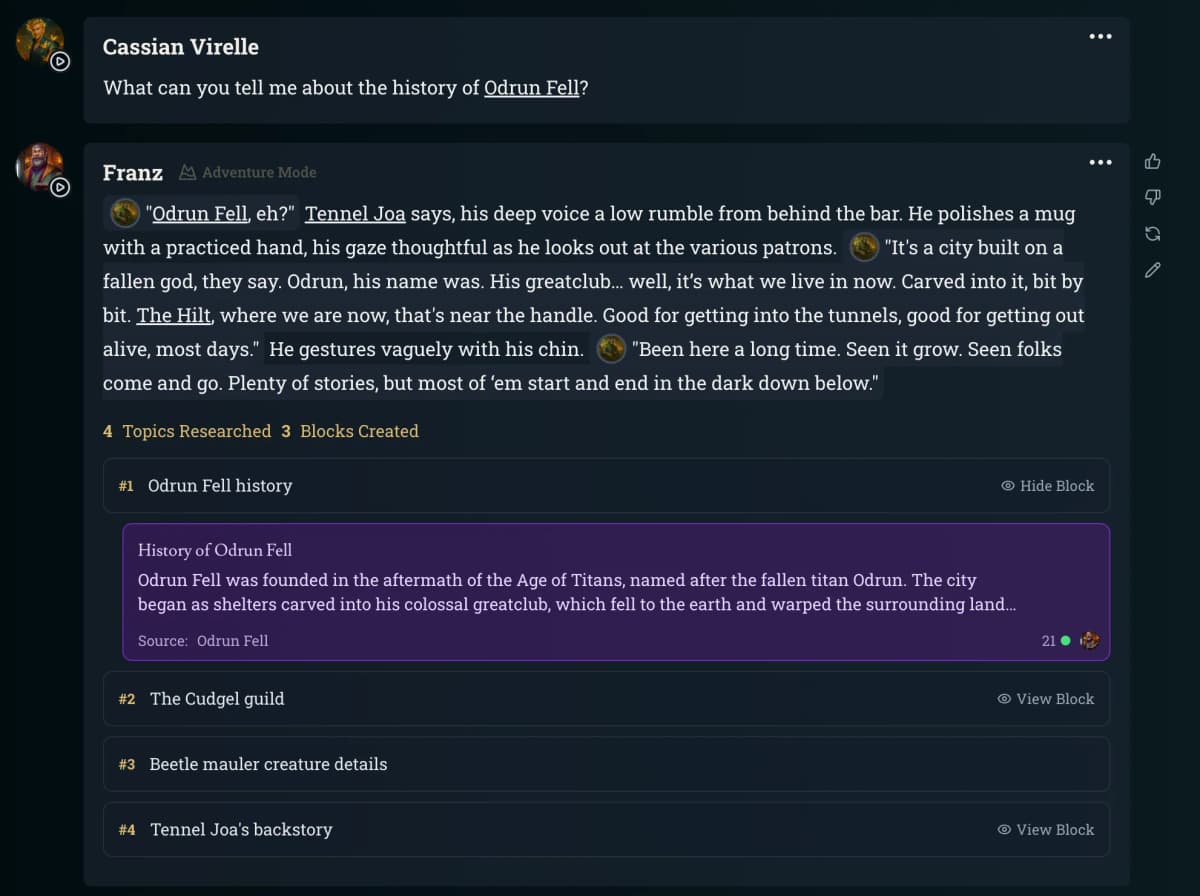
Memories → Plot + Long-term Memories
Previously, memories were created on every message and we would group the last 50-100 memories as a summary which we would then give to Franz. The idea here was to compress your messages into a concise summary, so Franz has a further view back to what happened in the campaign. This worked okay, but we found that the summary created from memories often included a bunch of fluff or irrelevant details.
We’re replacing this function with the Plot, which is a summary that Franz rewrites on every turn. It’s a much more concise and sensible history of events, which only really contains the most relevant plot points. Long term memories are still generated, but we now generate larger long-term memories every 5 messages and these memories are now editable. Long term memories are not used in Working Context directly, but the research step will search long term memories and bring them in if it deems they are relevant. With Context Blocks, you can also now guarantee that a specific memory is context even if the research step decided it was not relevant for the current scene.
We recommend players start new campaigns to get the best experience from these changes.
If you’re in an existing long campaign, the plot and plan should automatically catch up and sort itself out after a few messages, but you may need to edit the plot and add important memories as context blocks for any details long in the past.
Quests
We’ve found that the plot & plan are actually quite good for handling quests narratively, so we’ve decided to remove Franz’s on-the-fly quest generation. The quest system will still be used, but it is now meant only for player-made quests by world builders.
Custom Instructions
Custom Instructions are now replaced by Instruction context blocks when playing a campaign. We’ve left custom instructions at the world level, so world builders can set the default custom instructions. When someone starts a campaign in the world, the player’s context blocks will be populated with any default custom instructions set by the world builder.
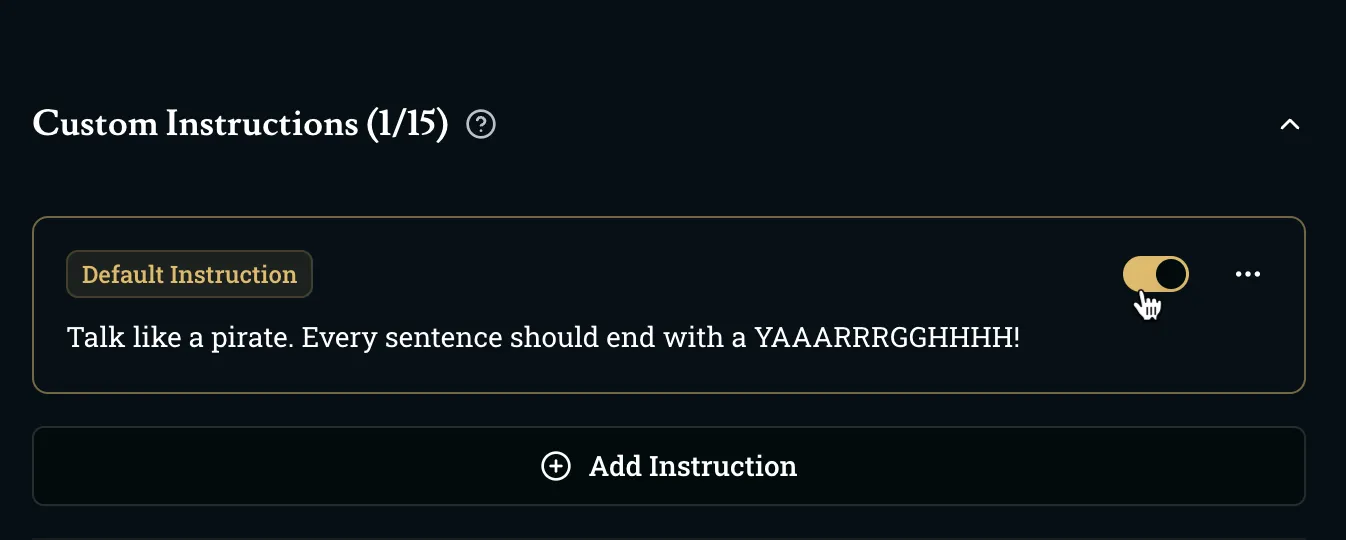
Note: Existing custom instructions in campaigns have NOT been automatically ported to ‘instruction’ blocks.
We know that in the past, these custom instructions have been used for other things such as lore or memories which are better suited under the lore and memory block types. Also with any major update like this, we recommend to first try playing with instructions off and then gradually add them as needed.
In a campaign, you can still see the set of existing custom instructions from before with a button to quickly add it as an ‘instruction’ block to bring it into working context.
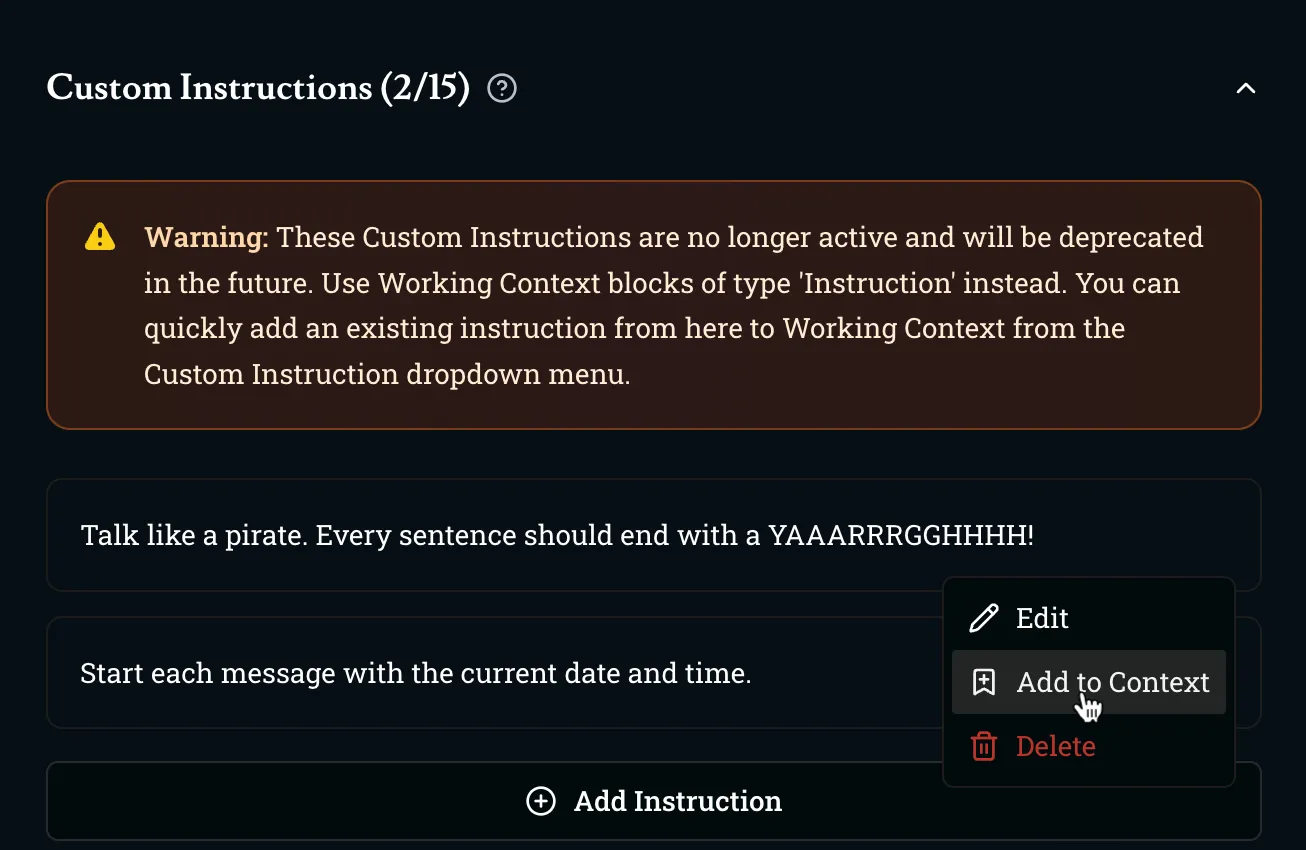
In the future, we plan to remove the custom instructions from the campaign settings, and on the world level replace it with an initial Context Blocks builder instead.
Subscription Plan Changes
We have removed short-term memory limits as they are no longer used in the same way. You have unlimited long-term memories, but they are not guaranteed to be used unless they are added to Working Context.
Free players can now play up to 3 player campaigns.
All subscription plans now have unlimited world slots. Free players now have 20 world slots.
All plans now have 15 custom instruction slots at the world level.
Plans now have Context Block total character limits. Please note this is not the same as a context window / total context we send to Franz. These limits only apply to context blocks.
Free - 4,000
Starter - 6,000
Pro - 7,500
Legend - 12,500
New Resources
This update has been really heavy on context management, so we’ve decided to write a couple blog posts that explain how LLMs and Franz works under the hood. I highly recommend you read these as they will help build your intuition for getting the most out of Franz and other LLMs!
Conclusion
We expect Franz 2.0 to be a huge improvement for all players, but fully expect that there will still be issues, both existing and new ones. We’ve set a better foundation to continue improving things like movement, item updates, and character creation and you should expect some more improvements coming soon. Please continue to submit those bug reports as we’ll be spending the next couple weeks tuning things up before starting work on anything new. We’ll also be making updates to the public roadmap soon, so stay tuned!
As always, thank you for playing and supporting Friends & Fables, none of this would be possible without you!